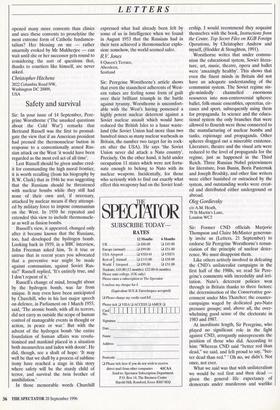Sir: Peregrine Worsthorne's article shows that even the staunchest adherents
of West- ern values are feeling some form of guilt over their brilliant triumph in the battle against tyranny. Worsthorne is uncomfort- able with the West's having possessed a highly potent nuclear deterrent against a Soviet nuclear assault which would have reduced the British Isles to a lunar waste- land (the Soviet Union had more than two hundred times as many nuclear warheads as Britain, the number two target for its rock- ets after the USA). He says 'the Soviet Union never did attack a Nato country'. Precisely. On the other hand, it held under occupation 11 states which were not fortu- nate enough to belong to Nato with its nuclear weapons. Incidentally, for those who seriously wish to find out exactly what effect this weaponry had on the Soviet lead-
ership, I would recommend they acquaint themselves with the book, Instructions from the Centre. Top Secret Files on KGB Foreign Operations, by Christopher Andrew and myself, (Hodder & Stoughton, 1991).
Worsthorne writes that under commu- nism the educational system, Soviet litera- ture, art, music, theatre, opera and ballet were 'amazingly healthy'. This shows that even the finest minds in Britain did not have an adequate understanding of the communist system. The Soviet regime sin- gle-mindedly channelled enormous resources into non-controversial spheres: ballet, folk-music ensembles, operettas, cir- cuses and sport, subsequently using them for propaganda. In science and the educa- tional system the only branches that were allowed to flourish were those connected to the manufacturing of nuclear bombs and tanks, espionage and propaganda. Other spheres dragged out a miserable existence. Literature, theatre and the visual arts were reduced to the level of propaganda for the regime, just as happened in the Third Reich. Three Russian Nobel prizewinners for literature, Ivan Bunin, Boris Pasternak and Joseph Brodsky, and other fine writers were either banished or ostracised by the system, and outstanding works were creat- ed and distributed either underground or abroad.
Oleg Gordievsky
c/o A.M. Heath,
79 St Martin's Lane, London WC2


















































































 Previous page
Previous page